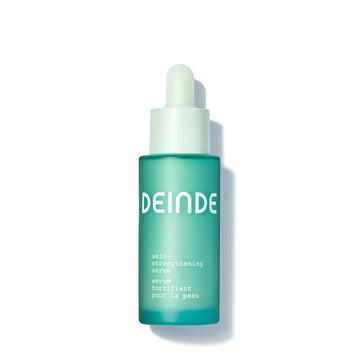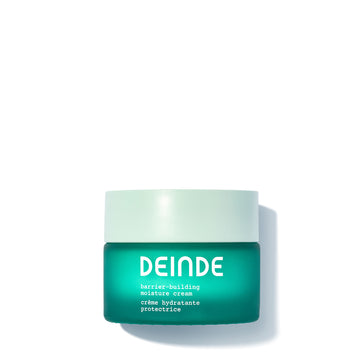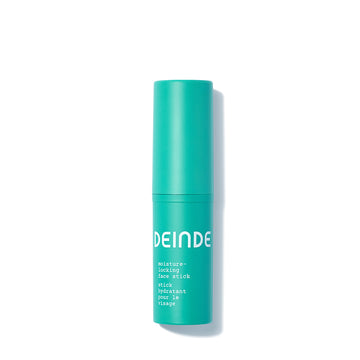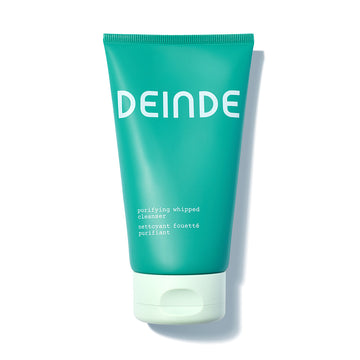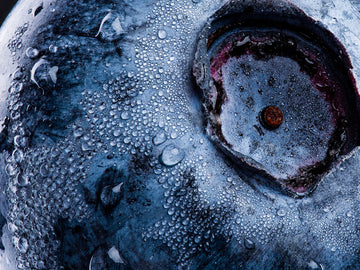
The Best Antioxidants for Skin
If there’s one thing we can go on about (and on and on…) it’s antioxidants. In part because our star ingredient, Naringenin, is one, and because they’re incredible multi-taskers when it comes to skincare.
Every day our skin faces many environmental aggressors, from UVB rays to cigarette smoke, and pollution. What do these all have in common (besides a general desire to avoid them)? They produce free radicals.
Free radicals may sound like a headliner at Woodstock, but they’re actually unstable molecules, that over time can cause cellular damage. Antioxidants are our best bet against free radicals. These substances work to neutralize the oxidative damage to your cells and tissues, and lucky for all of us, are easily found in a number of skin care products.
But how exactly do antioxidants work? And which ones should you look for when building a routine? We’re about to answer all your burning questions.
How do antioxidants interfere with free radicals?
Free radicals are molecules with an odd number of electrons. We can be exposed to them by environmental factors, but free radicals are also formed by some natural cell processes, like an immune system response.
We mentioned free radicals are unstable molecules, but what does that mean? Free radicals have an odd number of electrons, and they’re looking to steal one from your cells. Taking electrons from healthy, stable cells can damage them, and even cause them to die.
Antioxidants also have an uneven number of electrons, but unlike free radicals, they don’t actively go around scavenging them from other cells. However, when met with a free radical, they’ll readily pair and give up an electron. By doing so, antioxidants can neutralize free radicals and end the cycle of potential cell damage. We love them for that.
The most common sign of free radical damage to the skin is premature aging, leading to the development of fine lines and wrinkles, as well as hyperpigmentation.
If you’re wondering where you’ve heard of antioxidants before, it’s because they’re common in a variety of foods we eat regularly. Blueberries, oranges, spinach, broccoli, potatoes, and dark chocolate (yum), are just a few sources you should add to your plate.
What antioxidants are best for skincare?
While antioxidants can be found in food, but we’re not a farmer’s market–we’re skincare experts. When it comes to your routine, here are some powerful antioxidants to keep an eye out for:
Naringenin
A naturally occurring polyphenol, Naringenin can be found in citrus peels — and is the chosen active in DEINDE’s skin-strengthening serum and moisture-locking face stick. The percentage of Naringenin found in a grapefruit peel is incredibly low, meaning extracting enough to use in skin care would take an excess amount of land and water.
We recreated this cutting-edge ingredient in a lab, allowing DEINDE to harness its ability to fight inflammaging with fewer resources, and far more precision.
Naringenin is 15x more powerful than niacinamide, and is truly a multi-tasking antioxidant. It is proven to reduce inflammaging stress in skin cells by 96%, supports collagen production, provides stability to the skin barrier, and can combat the effects of UV rays and sun exposure. All that to say, she is busy!
Find naringenin in our skin-strengething serum and moisture-locking face stick.
Polyphenols
Polyphenols refer to a range of plant-based antioxidants, like Naringenin. Other polyphenols include green and white tea extracts, lycopene, and sea buckthorn. Polyphenols are known to have soothing properties that can help keep sensitive skin feeling calm and comfortable.
Green tea extract specifically may help protect the skin from sun damage and maintain skin cell health That's a powerhouse plant!
Vitamin C
Also known as ascorbic acid, vitamin C can be found in oranges, guavas, broccoli, and more. We love it in skincare because it’s been shown to support sun protection when added to sunscreen.
Bonus, vitamin C supports collagen production through fibroblasts, the cells found in connective tissue. Vitamin C can help brighten and even your complexion, and reduce the appearance of fine lines and wrinkles.
Vitamin E
A lipid-soluble antioxidant, vitamin E can pass easily through the cell membrane. You can find it in foods like almonds, spinach, and salmon — and it’s been used for over 50 years in dermatology. It’s found in the sebum, or oil in your skin, and can help hydrate and lock in moisture for overall healthy skin. Vitamin E can also help soothe skin after UV exposure, limiting swelling, dryness, and redness.
Resveratrol
This antioxidant may sound familiar because it’s found in a pasta pairing favorite — red wine. Naturally, it’s also in grapes, peanuts, cranberries, and pistachios. Resveratrol contributes to anti-aging effects by helping to support the skin during exposure to UVB ray damage, including oxidative stress.
Niacinamide
Niacinamide, or vitamin B3, is known for its ability to help reduce the look of fine lines, wrinkles, pigmentation concerns, and redness. But it doesn’t end there; niacinamide boosts the skin's antioxidant capacity by supporting healthy levels of NAPH, a molecule that helps neutralize free radicals. Reach for niacinamide if you’re looking to focus on skin tone and skin texture.
Coenzyme Q10
Coenzyme Q10, or CoQ10 (because who has the time), is found in all human cells, as well as foods like trout, chicken, and strawberries.
CoQ10 assists in energy production for cell repair and regeneration; in fact, up to 95% of your body’s energy needs might be provided by this antioxidant. It helps regenerate vitamin E, support skin cell health, and support proper levels of collagen.
Ferulic Acid
Another plant-based antioxidant, ferulic acid is not usually found on its own in serums or moisturizers. It tends to be paired with other antioxidants like vitamin C or E, because it can actually help improve their effects. Ferulic acid is the cherry on top of these formulations, bringing soothing and anti-aging properties to the table.
Are there any side effects of antioxidants in skincare?
When it comes to antioxidants, they really just seem to keep getting better. Generally, topical antioxidants present few negative side effects. Depending on your skin sensitivity, there is always the risk of irritation or worst case scenario, an allergic reaction. Overall, antioxidants are usually well-tolerated, but make sure to spot test before adding a new ingredient to your regimen.
When should I use antioxidants?
Antioxidants are a great addition both in your AM and PM routines. When applied in the morning, they can help prep your skin to face the day, as a supportive shield from UVB rays and other environmental elements. Overnight, antioxidants can help repair damage from the daytime, and help stimulate our natural antioxidants.
Our skin-strengthening serum is a great single-step solution if you’re looking to add antioxidants to the mix. Not only does it contain biotech-active Naringenin, but also niacinamide. In addition to these two antioxidants, our serum is formulated with biomimetic tripeptide, which supports the skin’s natural production, and upcycled date seed extract.
This extract is a clinically proven biobased ingredient that helps with skin tone and discoloration. In a study, 100% of users experienced healthier and more supple skin in just 4 weeks. What can we say, the ingredients speak for themselves.
Is it safe to mix antioxidants in skincare?
For the most part, yes, mixing antioxidants is completely fine for your skin, since they are not exfoliating or abrasive like AHAs or BHAs. We already know ferulic acid is a great companion to vitamin C, but so is vitamin E, as the two fight different types of stressors and UV damage.
Niacinamide is also a flexible antioxidant. Along with naringenin, it can also be used alongside vitamin C to tackle a dull complexion, hydrate skin, and reduce the look of signs of aging. Niacinamide may also be beneficial when it comes to acne, as it helps manage the amount of sebum your hair follicles produce.
Does storage matter when it comes to antioxidants?
Absolutely. Improper skincare storage can decrease the efficacy of active ingredients and shorten the longevity of your products. It’s best to store your serums, moisturizers, and other topicals in a cool, dry place, away from heat and humidity.
Vitamin C serums can be stored in the fridge, as this ingredient oxidizes, or breaks down when exposed to oxygen. But don’t worry about running out and buying a skincare fridge; a spot in your bedroom that receives limited light is also completely fine. If your product changes texture, color, or starts to smell strange, it’s best to toss it out regardless of expiration date.
Can I see a sample routine that includes antioxidants?
Your wish is our command. An easy way to identify the order of products is to layer from thinnest to thickest, or from least opaque to most opaque.
Morning:
- Antioxidant Serum: Set your skin up for success by adding a layer of protection and prevention with your select antioxidant serum.
- Moisturizer: Once your serum has been absorbed, lock in hydration with your favorite moisturizer. Our moisture-locking face stick contains naringenin, as well as hyaluronic acid and squalane for softer, smoother skin. Plus, it’s the perfect size to toss in your bag for all-day hydration support.
- SPF: We’ve said it once and we’ll say it again, completing your routine with SPF is the best thing you can do for your skin. You’ll want to a minimum of 30 SPF, and don’t forget to reapply, especially if you’re spending a lot of time outside.
Evening:
- Cleanse: Time to wash off the day. Our purifying whipped cleanser holds the unique ability to form a biomimetic barrier, designed to prevent fine particles, like pollution, from clinging to your skin.
- Antioxidant Serum: Give your skin cells the opportunity to restore and repair by using your antioxidants in the evening, too. Niacinamide or polyphenols are both great options to include in your nighttime routine.
- Moisturize: Seal in hydration for a good night’s sleep with a creamier, heavier option than you might use for daytime.
Keep in mind, that this is just a basic look at what your regimen may consist of; it does not account for products you may be using based on skin type, or if you’re managing issues like acne.
The TL;DR Of It All
Used properly, antioxidants can be your skin’s BFF. They’re touted for their ability to fight free radicals, and with good reason; antioxidants’ unique structure allows them to help neutralize the damaging molecules, and prevent extensive damage to your cells. If you’re experiencing expedited signs of aging, dull, or uneven skin tone, free radicals could be to blame.
Adding antioxidants to your skincare routine can help reduce the appearance of fine lines and wrinkles, fade hyperpigmentation, brighten and even your skin tone, and better protect your skin against UVB rays. Combining certain antioxidants can even promote their effects, like vitamin E or ferulic acid with vitamin C.
Because antioxidants aren’t harsh or stripping like AHAs or BHAs, they’re generally safe for all skin types and can be doubled up across morning and evening routines. Make sure to store your antioxidants (and other skincare products), in a cool, dry place, away from heat and humidity. Skip the bathroom and opt for the bedroom or other shower-free space.
Honestly, we can’t say enough good things about antioxidants–can you tell? The best part is you can start with your DEINDE products. The antioxidant world is big, but your routine doesn’t have to be.
Go on, show your cells some extra love with antioxidants.
Sources:
Antioxidants in dermatology | PMC
Plant-Derived Antioxidants: Significance in Skin Health and the Ageing Process | PMC
Biochemistry, Antioxidants - StatPearls | NCBI Bookshelf
Free radicals, antioxidants and functional foods: Impact on human health | PMC
